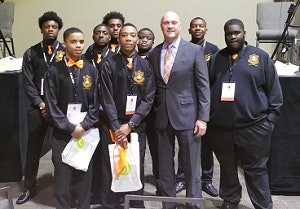GREENVILLE, S.C. – Improving outcomes for young men of color has become a personal goal for Dr. James P. Clements.
Clements, who is president of Clemson University – the second-largest public institution in South Carolina – has made it his business to draw attention to the plight of Black males by hosting the second annual Men of Color National Summit.
At a time when so many college leaders have only given lip service to closing the achievement gap among young Black and Brown students, Clemson – under Clements’ leadership – has made the issue a top priority, pumping resources into creating a pipeline for young men of color to enroll in college, not just in South Carolina but across the nation.
 Dr. James P. Clements with students at the Men of Color National Summit.
Dr. James P. Clements with students at the Men of Color National Summit.“It’s a mission for me,” says Clements in an interview with Diverse. “I’m first-generation. My parents didn’t set foot on a college campus. My grandparents didn’t graduate from high school. Education is the key. So, we have to make sure these brilliant young men graduate from high school, go on to college and go on to run companies and start businesses.”
More than 2,000 high school and college students traveled here to engage with high-profile speakers, community leaders and business leaders who offered advice and encouragement to the young men of color on how they can beat the odds and go on to become successful.
In this regard, Clemson is joining institutions such as The Ohio State University, which has the Todd Anthony Bell National Resource Center on the African American Male Center, in making young men of color a priority.
“Clemson strives to be a national leader for inclusive excellence and we are excited to have this opportunity to raise awareness of changes in the national landscape and conversation while also enhancing the experience of every attendee through involvement and engagement,” said Clements, adding that as a land-grant institution, the university has an obligation to provide solutions to the challenges that beset many young men of color.
Locally, Clemson has created Tiger Alliance, a college access program designed to help create pathways to college and build a college-going culture for Black, Latino and Hispanic high school students in grades nine through 12 in upstate South Carolina. Program participants benefit from access to information about college fairs and expos; a mentoring relationship with a current college student (Tiger Alliance Student Ambassadors); college-prep workshops and college tours.
Za’Corey Brown, a tenth-grader from Bamberg, S.C., was one of nearly 400 high school students across the state who are members of the Tiger Alliance.
Brown has aspirations of attending Clemson or the University of South Carolina when he graduates from high school in two years.
“I’m learning new things about how college works and am networking with others,” said Brown, who plans to major in engineering and join the band. “I think it’s really important for us to see what is possible for the future.”
In addition to Tiger Alliance, Clemson launched the Emerging Scholars program some 16 years ago to support families from economically disadvantaged areas along the I-95 corridor in South Carolina.
According to university officials, the Emerging Scholars Program equips students with the tools they need to begin a journey toward college by giving them university experience while they are in high school. Students are encouraged to apply and attend the university/college of their choice.
“Education is the key to a better life, not just for an individual, but for society,” said Clements, who was president of West Virginia University for five years before assuming the presidency at Clemson in 2013.
Media personalities Tom Joyner and Roland Martin engaged in conversations with the young men and Dr. Christopher Howard, president of Robert Morris University in Pennsylvania, delivered a rousing keynote address.
Throughout the Summit, there were a number of sessions on topics ranging from the “State of Black Education in South Carolina” to “Black and Latino Writing: Personal, Academic, Professional and Political Empowerment.”
Stacey Ashmore, who does community outreach for Greenville Family Partnership, a nonprofit that works with young people to discourage them from using drugs and joining gangs, said that the Summit has been life-changing.
“I’m here because I want to let these kids know what will happen to them if they make bad choices,” said Ashmore. “It is good to see a university investing in our young people and helping them to become successful. We need to do more of this.”
Jamal Eric Watson can be reached at [email protected]. You can follow him on Twitter @jamalericwatson.



![Mentor Mentee [60287]](https://img.diverseeducation.com/files/base/diverse/all/image/2024/04/Mentor_mentee__60287_.662959db8fddb.png?auto=format%2Ccompress&fit=crop&h=100&q=70&w=100)


















